報導中分析指出,大量年輕人參與這場投票,也是K黨慘敗的主因之一,年輕一代,關切的是「社會正義」,世代財富差距,貪腐,以及不公平的土地徵收政策。對於這類沈痾,K黨遭新世代指摘詬病。一位就讀大學的曾姓青年(Jason Chien)說,一般而言,新世代不會把票投給K黨,因為這個黨親中、政策不佳,而且貪腐,總是站在資本家立場思考問題。(民報2014.12.3)
wiki有"中文姓氏羅馬字標注"
中文姓氏羅馬字標注- 维基百科,自由的百科全书 :Chien 是簡或錢
(德國之聲中文網)35歲的章子怡在正在舉行的第45屆印度國際電影節上表示,王家衛拍戲時沒有任何劇本,"他就是我的'師傅',他給了我一個機會在他最後一部膠片長片《一代宗師》中出演角色。"他有自己獨特的電影風格。
hc:last film 是上一部。王似乎沒宣布要退休。
----
九歌出版他的傳記《王爾德的黃金時代》,張世音摘譯,1983。翻譯有些問題,譬如說,p.67 的"我真是個美男子。" (I am a very narcissus.)--- 末字典出希臘神話,現在通常取"自戀的(人)"意思。
-----
本葉慢慢建立相關的翻譯期刊。台灣可能落後香港30年。
Renditions is the leading international journal of Chinese literature in English translation, covering over 2000 years of Chinese literature from classical works of poetry, prose, and fiction to recently published works by writers representing the rich variety of contemporary Chinese literary expression. Articles on art, Chinese studies and translation studies are frequently included. Each issue is illustrated with complementary art, calligraphy and photographs. Renditions has been published by the Research Centre for Translation of The Chinese University of Hong Kong since 1973.
The general reader will be entertained and informed, finding in Renditions a unique and fascinating gateway to Chinese culture. The specialist will find careful scholarship and a commitment to excellence in the fields of Chinese literature and translation.
|
Publications: Renditions
|
No. 80
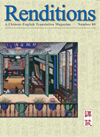 | (Autumn 2013)
This issue is another collection of writings in various genres and from different periods of Chinese history. We are both delighted and honoured to begin it with the late Professor D. C. Lau’s translation of the ‘Advanced School of Learning’ (Daxue), that foundational Confucian text offering sage advice on self-cultivation that was a moral guide in China for many hundreds of years. Other highlights include a Song dynasty tale of elopement and the resulting court case, and seventeenth century critic Jin Shengtan’s insightful commentary on the Shuihu zhuan. Included also are ‘The History of Humanity’, an important 1907 essay by Lu Xun, a thought-provoking exploration on the differences between Chinese literature and civilization and the Western institutions by the controversial writer and critic Hu Lancheng, followed by ten contemporary poems by Chien Chengchen, and a short story from 1930s Shanghai by the ‘new sensationalist’ Mu Shiying.
Table of contents
Order |
No. 79
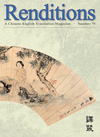 | (Spring 2013)
The issue features a selection of work representing a variety of periods and genres of Chinese literature. Highlights include “Lament over My Poor Fate,” an extraordinary long poem of female authorship from the Song dynasty translated by Wilt Idema, a selection of Huang Zunxian’s writings on Japan, translated by Jack Chen and Yunshuang Zhang, followed by a commentary essay by Cheng Yu-yu of National Taiwan University. We will also continue our serialization of David Hull’s translation of Waverings, Mao Dun’s epic of the 1927 revolution.
Table of contents
Order
|
Nos. 77 & 78
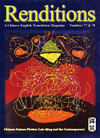 | (Spring & Autumn 2012)
Chinese Science Fiction:
Late Qing and the Contemporary
This issue showcases representative work of Chinese science fiction from the late Qing and the contemporary. As a popular genre, science fiction has energized modern Chinese literature by evoking a whole array of sensations ranging from the grotesque to the sublime, from the Utopian to the apocalyptic, and from the human to the post-human. It mingles nationalism with fantasy, envelopes politics in scientific discourse, and delivers sharp social criticism with an acute awareness of probabilities and possibilities. Science fiction today both echoes and complicates the late Qing writers' vision of China's future and the transformation of our species and universe, and this special issue aims to contextualize a comparative reading of some important Sci fi writings from these two epochs and the similar expectations and anxieties they bring to Chinese readers.
Table of contents
Order
|
No. 76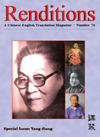 | (Autumn 2011)
Yang Jiang
In celebration of Yang Jiang's centenary year, this special issue presents a sampling of works from Yang's eight-decade-long career, including new translations of some of her best essays and short stories, as well as excerpts from her first play (Heart's Desire, 1943), her memoirs, and her most recent book, Arriving at the Margins of Life: Answering My Own Questions (2007). Born during the year of the Republican Revolution, Yang Jiang (1911– ) went on to distinguish herself as one of modern China's most accomplished and versatile scholar-writers. Best known for her understated yet often humorous prose style, Yang is also an accomplished playwright and novelist; a prodigious translator from French, Spanish, and English; and an influential memoirist and intellectual who has come to be regarded by many as a paragon of modern Chinese humanism.
Table of contents
Order |
No. 75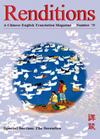 | (Spring 2011)
Special Section: The Seventies
This issue focuses on a set of translations from the collection of reminiscences edited by Bei Dao and Li Tuo, The Seventies. A compendium of writings on their experiences of the decade that has proved so pivotal to contemporary China by a large group of writers who lived through it, the work has attracted great attention in the Chinese-speaking world. Also included is a prizewinning translation of the first three chapters of Mao Dun's Waverings, at once the second novella of the Eclipse trilogy, the author's first venture into prose fiction and a key document of the 1927 revolution.
Table of contents
Order |
No. 74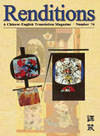 | (Autumn 2010)
This issue begins with a Scots translation of Du Fu's 'Autumn Meditations', accompanied by an essay that reflects on the considerations in translating poetry. A deeply felt eulogy to the late modernist poet from Taiwan, Shang Qin, is written by his friend and fellow writer Wai-lim Yip. Lu Xun's essay 'Lessons from the History of Science' sheds light on the series of events that Chinese thinkers and writers were faced with at the turn of the 20th century. Other features comprise superb translations of three contemporary poets, Han Dong, Genzi, and Wann Ai-jen, an anti-war short story by Xue Yiwei, and a short essay by Bei Dao.
Table of contents
Order |
No. 73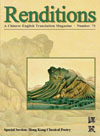 | (Spring 2010)
Special Section: Hong Kong Classical Poetry
The fifty-page special section features the works by twenty-four local poets from the yesteryears, illustrated with historical images of Hong Kong. They portray a pastoral and historically-conscious Hong Kong before she evolved into the fast-moving cosmopolitan city known to the world today. Also included in the issue are excerpts from Yu Jian's travel writing, Liu Yichang's short story, and Li Yu's discourse on food and doctoring.
Table of contentsOrder |
No. 72
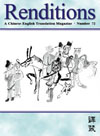 | (Autumn 2009)
This miscellaneous issue features excerpts from Jin Yong's martial art novel The Smiling, Proud Wanderer, a short story about Japanese expatriates in Taiwan upon their WWII defeat, as well as Li Yu's exposition on the theatre. Also included in the issue are selections of poems by Liu Yong and the Tang-dynasty monk, Jiaoran.
Table of contentsOrder |
No. 71
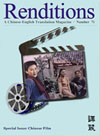 | (Spring 2009)
Chinese Film
Extracts from Chinese film scripts and other texts from the 1930s to this century are included in this issue. They range from The New Woman (1934), starring Ruan Lingyu, toChunmiao (1975) from the Cultural Revolution, and include a storyboard from Zhang Yimou's Hero (2001). Fei Mu's Spring in a Small Town (1948) is a highlight. The issue will explore whether the literary film script (dianying wenxue juben) is a uniquely Chinese invention, written like fiction but reflecting what we see on the screen. The more usual shooting-scripts of several titles will also be included and pages from them will help illustrate the issue.
Table of contentsOrder |
|
*****
*****
《
廣譯:語言、文學、文化翻譯》
(the page 尚未建立)期刊
作為國內第一本意圖跨越院校壁壘的翻譯研究學術期刊,《廣譯》象徵著一個契機的來臨:終於在國內各翻譯系、所、中心以及全體翻譯研究人員之間,我們擁有了一個共同的學術平台,讓「眾聲喧嘩」──不論是個人創見、對立爭論、相互批評、應聲附和、互相砥礪、甚至妥協、共謀等等──不致淪為某種學術假象或是某個文化口號。簡言之,《廣譯》是of, by, and for the academics。
《廣譯:語言、文學、與文化翻譯》第十一期徵稿啟事
2014-04-18
一、本期刊由國立政治大學外國語文學院翻譯中心與南京大學外國語學院翻譯研究所合作發行,刊載有關翻譯研究之學術論文,歡迎海內外學者專家踴躍賜稿。
二、本期刊以中文發表為主,但亦接受以外文撰寫之稿件。中文論文以一萬五千字為度,外文論文則以A4紙三十頁、隔行打字為準。來稿須附中、外文摘要(三百字)以及六個中、外文關鍵詞。
三、來稿請依序檢附下列資料:論文題目、作者姓名、任職單位及現職、論文摘要、本文、參考文獻。
四、論文撰寫之相關格式請參閱國立政治大學外國語文學院
《外國語文研究》網頁。
五、論文經兩位專家學者匿名審查合格後採用。著作權歸作者所有,出版權則歸本期刊。
六、本期刊原則每半年出版一期,另不定期出版專刊研究特定翻譯議題。來稿隨到隨審,一經採用發表,贈送當期《廣譯》兩本,不另支稿酬。
七、來稿請寄:(116)臺北市文山區指南路二段64號 國立政治大學外國語文學院翻譯中心《廣譯》編輯委員會。
八、本期刊聯絡電話、傳真、以及E-mail地址為:
電話:(02)29393091轉62739
傳真:(02)29390459
E-mail:trans@nccu.edu.tw
九、《廣譯》
第十一期徵稿期限為2014年6月30日,歡迎踴躍來稿。
















沒有留言:
張貼留言